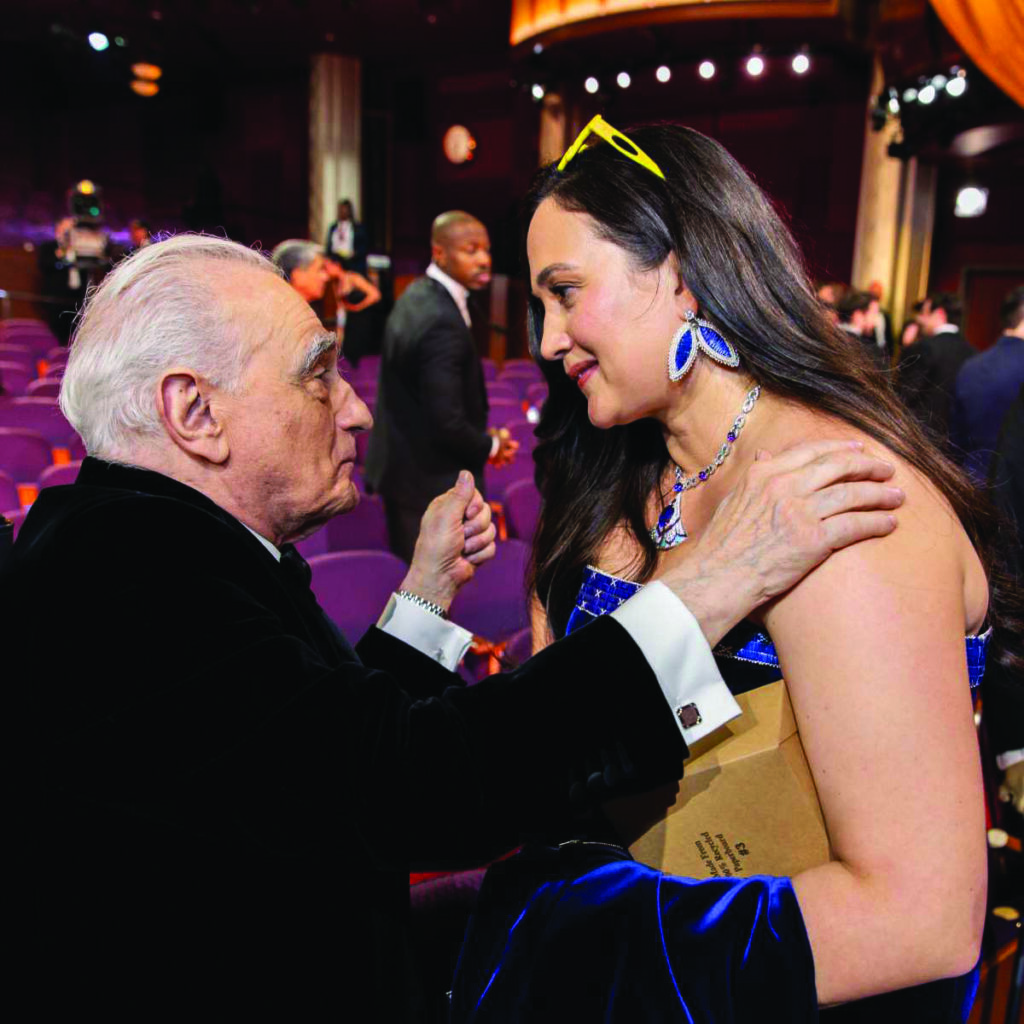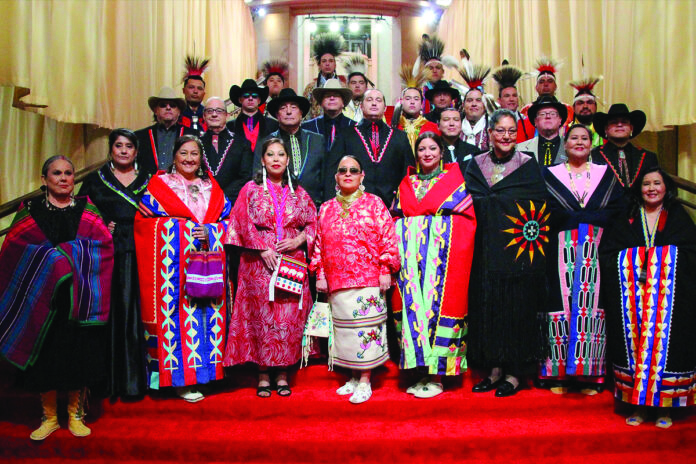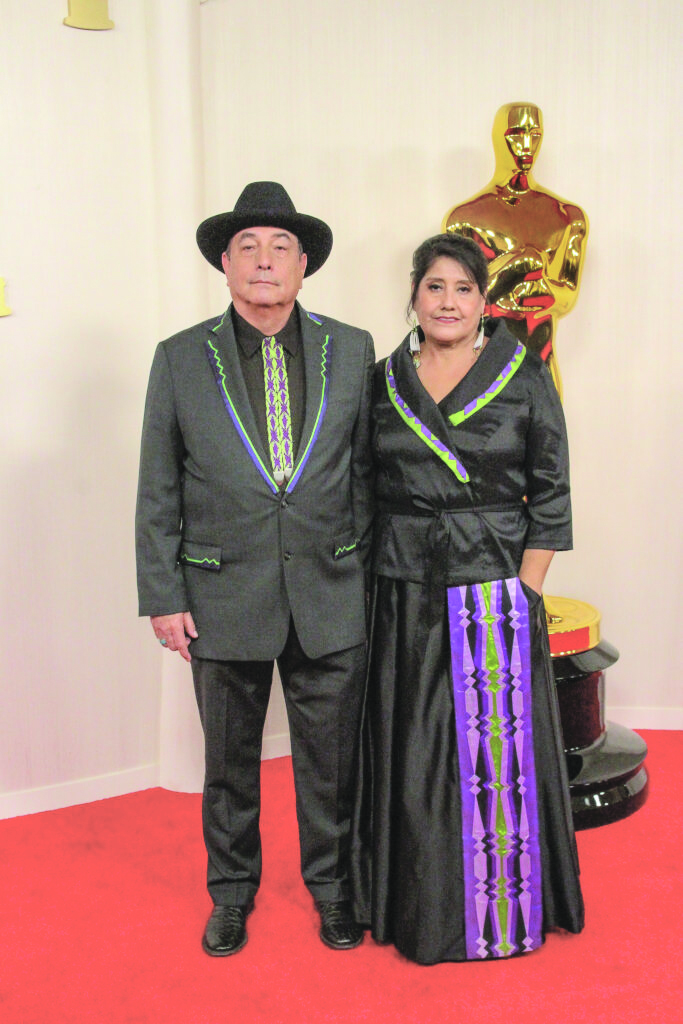A wave of emotions after Oscars

Martin Scorecese and Lily Gladstone after the live ABC telecast of the 96th Oscars® at Dolby® Theatre at Ovation Hollywood on Sunday, March 10, 2024. (Lily Gladstone Updates on X)
Maybe it was because her nomination was the first for a Native actress. Maybe it was the optimism of film critics at her chances. Maybe it was the reality that Native people have been holding their breath for nearly a century waiting for Hollywood to see us.
Perhaps it was simply Lily Gladstone’s own poise and grace in carrying the hopes of her people.
Whatever the reason (and probably for all these reasons), Native people struggled to make sense of Gladstone losing to actress Emma Stone for best actress at the Academy Awards Sunday night.
It was a historic moment for Native people that featured the first Native performer to be nominated for best actress. Gladstone broke numerous barriers on her road to the Oscars, including becoming the first Native person to be nominated for and to win best actress by both the Screen Actors Guild and the Golden Globes.
Few will soon forget her words when accepting the Golden Globe.
“This is for every little rez kid, every little urban kid, every little Native kid out there who has a dream, who is seeing themselves represented in our stories, told by ourselves, in our own words, with tremendous allies and tremendous trust,” Gladstone said.
Perhaps it was Gladstone’s ability to stand up for Indigenous causes, such as Native representation in film and media and Missing and Murdered Indigenous Relatives, during her Oscars public relations campaign that inspired many to express frustration at her loss.
“Reservation Dogs” actor Dallas Goldtooth, wrote on X: “How do you say ‘robbed’ in Blackfoot? Asking for a friend. Just kidding, I’m asking for myself.”
Lucas Brown Eyes, an Oglala Lakota TV writer, was frustrated not just by Gladstone not winning but by this being the only real chance Native Americans have had.
“It took 95 YEARS for a Native (Blackfeet) woman to get a nomination like this,” wrote Brown Eyes on X. “The ‘make up’ Oscar doesn’t work for Natives when this industry gives Natives opportunities once in a century.”
Artist Ricardo Cate offered his take on Oscars night. Indeed, “Killers of the Flower” lost in all 10 Oscar categories in which it was nominated, losing in many categories to Christopher Nolan’s “Oppenheimer” and Yorgos Lanthimos’ “Poor Things.”

Oscar nominated singer Scott George, the Osage singers and dancers pose for a photo on the Oscars red carpet on the steps of the Dolby Theatre in West Hollywood on March 10, 2024. Top row, from left, Hominy Drumkeeper Joseph Goodfox, Grayhorse Taildancer Xavier Toehay. Second row, from left, Grayhorse Drumkeeper George Shaw, Pawhuska Drumkeeper Cole Burris, Osage singer Paul Bemore, Pawhuska Taildancer Sammy Lookout, Pawhuska Taildancer Jamison Cass. Third row, Hominy Taildancer Reuben DeRoin, Osage singer Mason Bighorse, Osage singer Vann Bighorse, Grayhorse Taildancer Jaydin Shaw, Hominy Taildancer Amos Dailey, Grayhorse dancer Joe Ellis. Fourth row, Osage singer Kenny Bighorse Jr., Osage singer and ON Congressman Scott BigHorse, Oscar-nominated singer Scott George, Osage singer Norris Bighorse, Osage singer Eddie Yellowfish Jr., Osage singer John Shaw, Osage singer Kingston Pipestem. Bottom row, Lady singers Julia Lookout, Taveah George, Angela Toineeta, Jennifer Moses, Jacque Jones, Allie Toineeta, Lynette Satepauhoodle, Charisse Satepauhoodle and Anna Bighorse. ECHO REED/Osage News
Nevertheless, others, like the nation’s largest Native advocacy organization, the National Congress of American Indians, expressed only love and support of Gladstone. NCAI posted on X Monday, calling Gladstone’s achievements “a milestone for authentic Native representation.”
“Lily Gladstone has undeniably left an indelible mark, breaking barriers and inspiring countless individuals with her remarkable presence and commitment to storytelling,” said the Blackfoot Confederacy, a tribal council for the Blackfoot Confederacy Nations of Kainai-Blood Tribe, Siksika, Peigan-Piikani and Aamskapi Pikuni.
“Her representation is a source of pride for the Blackfoot Confederacy, The Osage Nation, and all indigenous communities, resonating far beyond the confines of a single ceremony.”
It’s safe to say Native people experienced a range of emotions after actress Michelle Yeoh announced the award would go to Stone. Even the “Poor Things” star looked stunned as she slowly rose from her chair to accept the award.
As a testament to her own grace, Stone addressed Gladstone directly while holding her golden statue on stage, saying she was “in awe” of the Siksikaitsitapii and Nimíipuu actress.
“I share this with you,” she told Gladstone. “I am in awe of you. And it’s been such an honor to do all this together. I hope we get to do more together.”
Across social media, many expressed a mix of frustration and support.
Film industry experts offered their own opinions as to why Gladstone lost, including writer and filmmaker Jason Asenap, Comanche and Muscogee, who told ICT that the announcement Sunday night stunned him and other Native people attending an Oscars watch party in Albuquerque.
“I thought the momentum was going her way,” he said.
Leading up to Oscars night, however, he said he worried Gladstone’s character Mollie Burkhart simply wasn’t given enough screen time in “Killers of the Flower Moon” compared to Stone’s Bella Baxter in “Poor Things.”
“She was gone most of the last third of that film,” Asenap said. “I thought that might go against her, and
Gladstone appeared little in the last hour or so of Director Martin Scorsese’s epic film about the 1920s Osage Reign of Terror.
Other film critics agreed that Gladstone – whose character wasn’t as central to her film as Stone’s was to hers – wouldn’t measure up in the eyes of Academy members. Martha Ross of the Mercury News wrote that many awards watchers predicted Gladstone would lose, not because she didn’t give a “superb performance” but because of her relatively limited screen time and because her character wasn’t the film’s narrative focus.
Gladstone, Ross wrote, is on screen for about 56 minutes in a film that is three hours and 26 minutes long, compared to leading man Leonardo DiCaprio’s 1 hour and 49 minutes of screen time. Some film pundits even argued Gladstone should have been nominated in a different Oscars category altogether.
“Gladstone’s limited screen time also sparked debate months ago over whether her role was supporting and she should have campaigned in the supporting actress category,” Ross wrote.
Asenap, meanwhile, took aim at Hollywood’s failure to give Native people the opportunity to tell their own stories, saying a Native filmmaker likely would have approached the subject of the Osage murders much differently than Scorsese did.
“It’s a movie based on a white book and it’s a white filmmaker,” he said. “It’s not an Indigenous filmmaker. Unless we get to tell our own stories in our own ways, the Indigenous narrative will not truly be centered in the way that it should be.”
Still, he said, he believes Gladstone is only at the start of a brilliant acting career.
“I think she’s a terrific actress,” he said. “I see her having a bright future.”
In the end, the celebratory Oscars moment for Natives came during the Osage Tribal Singers’ performance of Scott George’s Oscar-nominated “Wahzhazhe” (A Song for My People). More than a dozen singers and dancers surrounded the nine-member drum group.

Oscar-nominated Osage singer Scott George and wife Taveah, who also sings on the Best Original Song nomination for “Wahzhazhe (A Song for My People).” ECHO REED/Osage News
Inside a ballroom, many miles from Los Angeles, nearly 100 Osage citizens gathered Sunday night to watch their own take the stage at the Academy Awards. With champagne in hand, those gathered erupted into thunderous applause as the Osage singers took the stage.
Later, several Osage audience members complimented the power of Gladstone’s performance in helping them heal from historical wounds. Pamela Shaw, an Osage citizen, said Gladstone eased the concerns of Osage women about how they would be portrayed in the film.
“The love and care Lily Gladstone put into this role goes far beyond acting and has given us the opportunity to cry, smile and perhaps even heal just a little from the unspeakable terror our people experienced,” Shaw said.
The post A wave of emotions after Oscars first appeared on Native Sun News Today.
